
Top Fintech App Development Companies: 10 Trusted Names for Enterprises & Startups
75 Views 10 min September 27, 2025

Hardeep Singh is a seasoned B2B technical writer at Apptunix with a sharp eye for strategy and a mind wired for innovation. With over a decade of experience in technical and SEO writing, and a Master’s degree in Wireless Communication, he’s written across domains including AI, Blockchain, IoT, Cybersecurity, and beyond. At Apptunix, Hardeep drives content that bridges business goals with future-ready mobile and web solutions, thus helping startups and enterprises make smarter digital decisions.
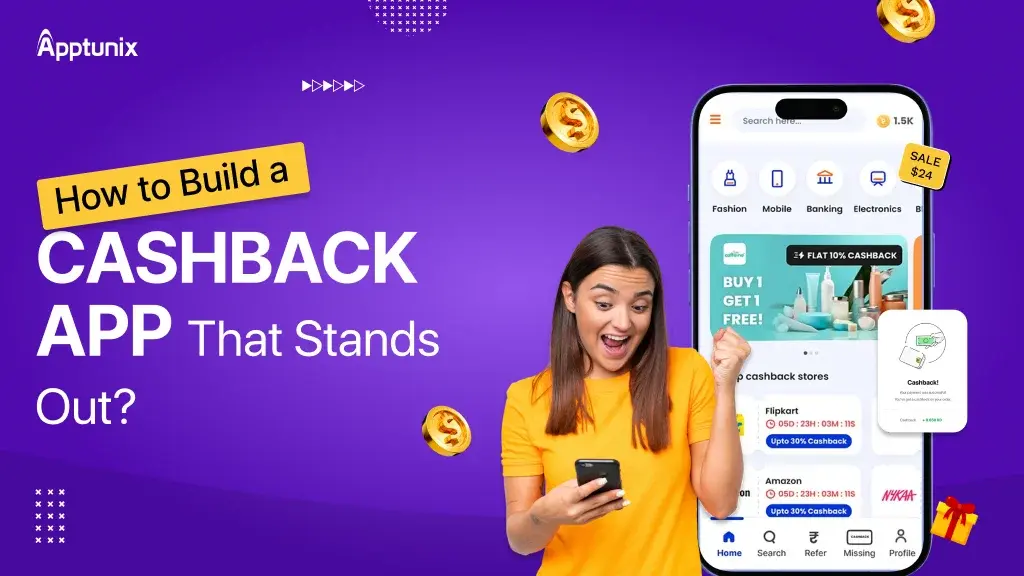
Why are cashback apps being called the next big fintech disruptor?
Because they bring something people truly value - real savings. Every purchase turns into an opportunity to earn, and that makes them stand apart from traditional loyalty programs.
The growth numbers make the trend even clearer. According to Global Growth Insights, the Global Cash Back and Rewards App Market is projected to reach USD 4,073.23 million in 2025 and an impressive USD 6,995.03 million by 2033, growing at a steady CAGR of 6.99% between 2025 and 2033. The rise of mobile payments, booming eCommerce transactions, and consumer interest in smarter savings are fueling this expansion.

And for users, a cashback app is a simple way to save money while shopping and even earn rewards that feel like free cash. For businesses, it solves a bigger challenge: customer loyalty. Brands now compete fiercely for attention, and cashback incentives help them retain buyers.
Some of the top cashback app platforms, like Rakuten, Ibotta, and Honey, prove just how much people value these services. Shoppers not only use them to cut costs but also view them as trusted apps for cash back on daily purchases.
This growing demand is why companies across industries are rushing to build cashback app solutions. As we move through this blog, we will explore exactly how these apps work, what features make them successful, the costs involved, and the steps to bring your own cashback idea to life.
A cashback application is one that rewards users with a percentage of their purchase value in the form of real money or redeemable credits. Instead of relying on traditional loyalty points that often go unused, these apps create a sense of instant value by offering rewards people can actually spend.
The process is simple. A user makes a purchase through the app, the transaction is tracked via affiliate links, and cashback is calculated. The earned amount is then credited to the in-app wallet. Once the balance reaches a set limit, users can transfer it directly to their bank account, PayPal account, or redeem it as a gift card.
Popular examples of cashback apps that pay real money include Rakuten, Ibotta, TopCashback, and Honey. These platforms have set industry benchmarks by offering seamless shopping experiences combined with tangible savings. They have also proven that apps with cash back are not just a trend but a reliable way to attract millions of loyal users.
This growing popularity is the reason companies across industries are investing in cashback app development. For shoppers, these apps provide real savings on purchases they already plan to make. For businesses, they act as powerful tools to increase customer retention and encourage repeat transactions.
The demand for cashback solutions is no longer a passing trend. Businesses are realizing the power of rewarding users directly with real savings, while shoppers see these apps as an easy way to earn from everyday purchases. This dual advantage is the key reason many companies now plan to make cashback app solutions part of their growth strategy.
A successful cashback app depends on its features. The right combination of functionality and user experience ensures higher engagement, loyalty, and revenue. While basic features can get an app running, advanced features add value but also increase the cashback app development cost.
Here’s a detailed breakdown of cashback app’s essential features:
| Feature | Purpose | Impact |
|---|---|---|
| User Registration & Profile | Easy onboarding | Higher adoption and seamless login experience |
| Cashback Tracking System | Real-time tracking of purchases and rewards | Builds trust & transparency |
| Wallet Integration | Secure storage for rewards | Increases engagement and retention |
| AI-Based Personalization | Suggests the best offers to users | Higher retention and better user experience |
| Push Notifications | Alerts for offers, cashback, and reminders | Boosts app usage and engagement |
| Multi-Payment Gateways | Enables flexible withdrawals | Provides a better experience and convenience |
| Gamification | Rewards, badges, spins, leaderboards | Makes the app fun and sticky for users |
Incorporating features like AI personalization, gamification, and multi-payment integration can elevate the app experience. However, it’s important to note that advanced features naturally increase the cost to build a cashback application. Whatever, these functionalities are what make a platform stand out among the top money back apps.
Choosing the right technology stack is crucial when planning to develop cashback app solutions. It ensures that the platform is scalable, secure, and capable of delivering a seamless experience to users. Each layer of the tech stack plays a vital role in performance and reliability.
Frontend
Backend
Database
APIs
Security
A strong tech foundation makes it possible to build cashback software that performs well under heavy usage while maintaining top-notch security. This is what transforms a simple cashback tool into an app that gives money users can truly rely on.
Building a cashback app isn’t just about rewarding users, but also a profitable venture for businesses. The right monetization strategies ensure that while users save money, companies generate steady revenue. Here are the most effective models:
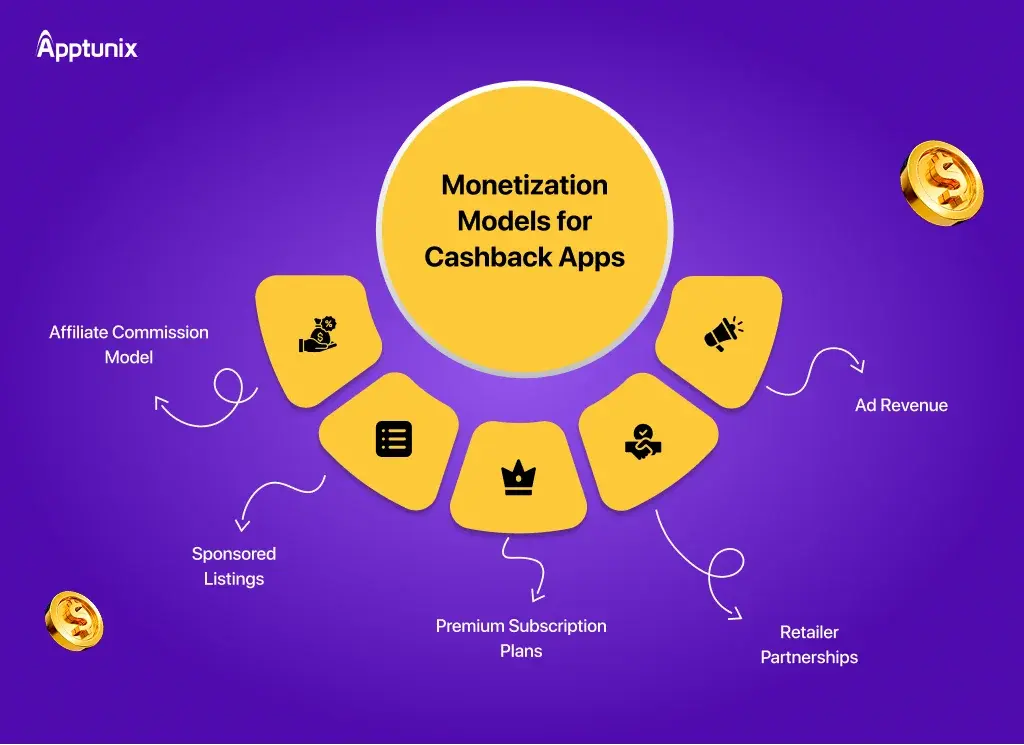
Every time a user shops via affiliate links, the app earns a commission from partnered retailers. This is the backbone of most apps for cash back.
Brands pay for featured placement within the app, thus gaining visibility and attracting shoppers directly.
Users can opt for paid tiers to unlock higher rewards, exclusive offers, and priority support.
Strategic collaborations with eCommerce platforms and stores bring mutual benefits. Discounts for users and traffic for retailers.
Display ads, video ads, and special promotions generate additional income while keeping the app free to use.
Well, with the right mix of these models, a cashback platform can evolve into a sustainable free money earning app that benefits both users and businesses.
Also Read: How Much Money Do Mobile Apps Make?
Creating a successful cashback platform requires careful planning and execution. Whether you are targeting startups or established retailers, following a structured process ensures the app runs smoothly and delivers value. Here’s a practical guide on how to build cashback app solutions from scratch:
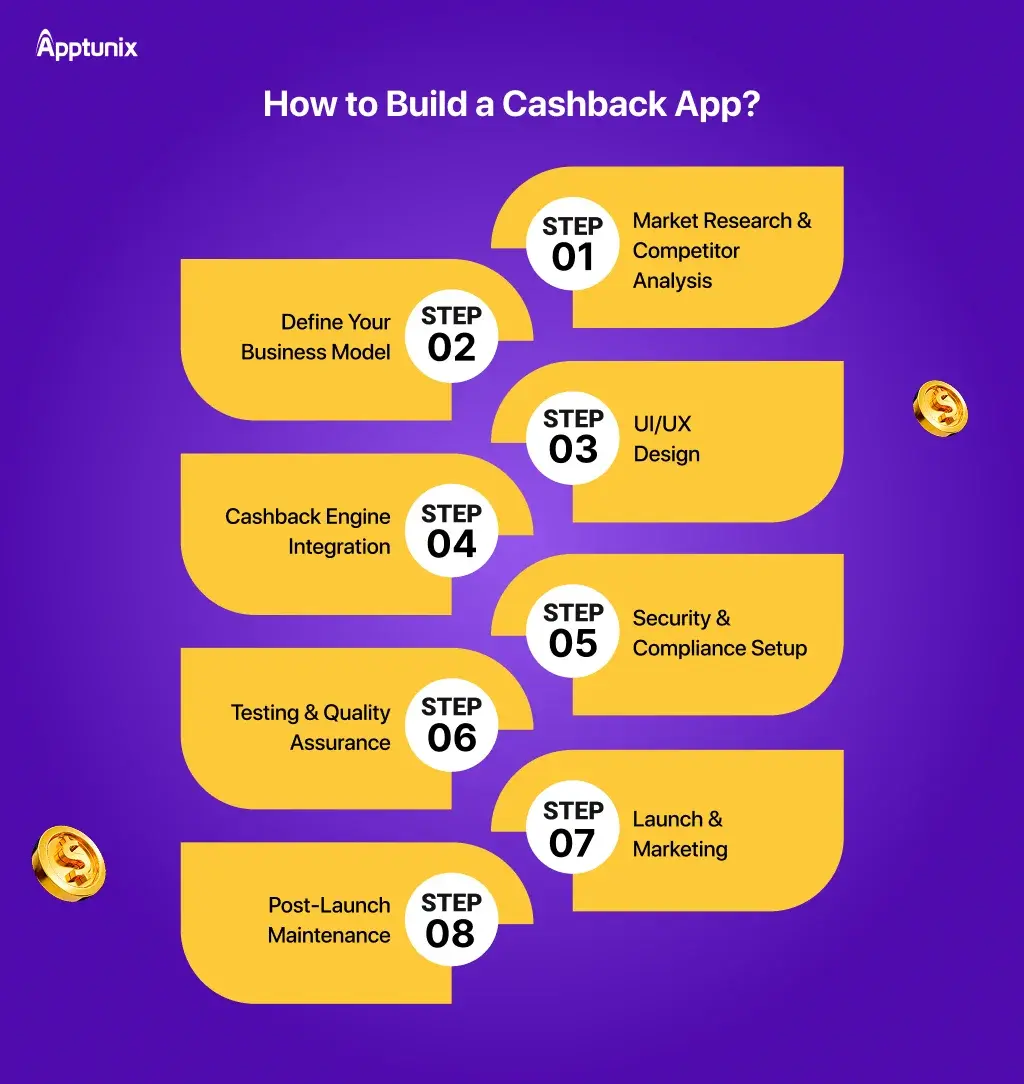
Step 1: Market Research & Competitor Analysis
Study existing apps with cash back like Rakuten, Ibotta, and Honey. Identify gaps and the user needs to design a stronger offering.
Step 2: Define Your Business Model
Decide whether you will earn through affiliate commissions, subscriptions, or partnerships. This foundation shapes the rest of your app.
Step 3: UI/UX Design
Focus on simplicity, engaging layouts, and gamified elements. A clean design builds trust and improves retention.
Step 4: Cashback Engine Integration
Develop the logic for real-time tracking of purchases, rewards, and payouts. This is the heart of every cashback application.
Step 5: Security & Compliance Setup
Implement encryption, fraud detection, and KYC to ensure a secure platform that meets financial regulations.
Step 6: Testing & Quality Assurance
Rigorously test for bugs, performance, and compatibility before launch to avoid costly errors later.
Step 7: Launch & Marketing
Roll out your app with targeted campaigns. Highlight rewards and savings to attract first-time users quickly.
Step 8: Post-Launch Maintenance
Regularly update features, optimize performance, and introduce new offers to keep your app competitive.
Well, taking these steps ensures you not only make cashback app solutions functional but also scalable and profitable in the long run. In other words, by following this roadmap, businesses can confidently build cashback app platforms that stand out in today’s market.
Also Read: How to Develop a Fintech App Like STC Pay
The cost to make a cashback app typically ranges from $20,000 to $150,000+, depending on various factors. Businesses must align their budgets with their goals - whether building an MVP for testing or launching a full-featured platform. In short, you must plan carefully to balance affordability with long-term scalability.
We will go for a full cost breakdown, but before diving into details, it's crucial to understand the factors that directly affect the cashback app development cost.
When it comes to the factors, the list is extensive. We will discuss only the major factors that most significantly affect the development cost.
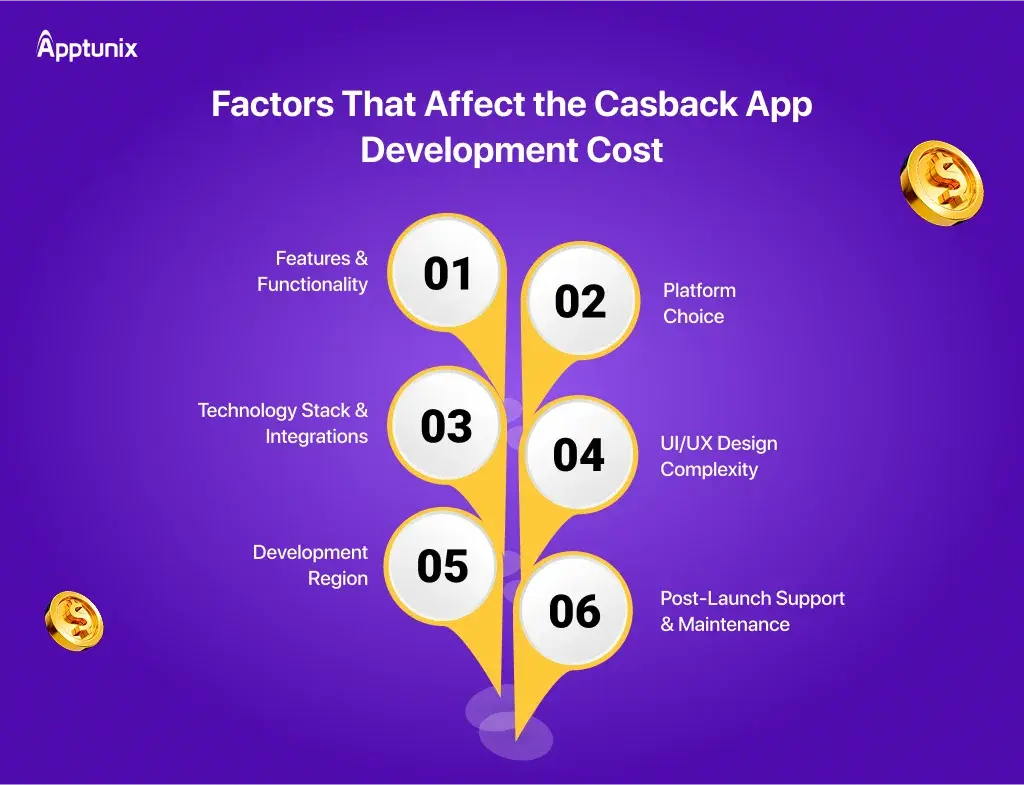
The number of features, such as real-time cashback tracking, multi-payment gateways, gamification, and AI personalization, plays a big role in pricing.
Developing for Android, iOS, or Hybrid (cross-platform) directly affects the timeline and cost.
Also Read: iOS App Development Cost 2025: Full Guide
The integration of affiliate APIs, payment gateways, and security modules increases the cost of developing a cashback app.
Simple designs cost less, while engaging, gamified interfaces require more effort and resources.
Rates vary widely across geographies. For example, developers in the USA and UK charge significantly more than teams in India or Dubai.
Ongoing updates, bug fixes, and security patches are critical for apps that aim to scale and compete with free money making apps.
Below is a breakdown of the cost to develop cashback app based on complexity and region.
| App Complexity | Description | Estimated Cost Range |
|---|---|---|
| Simple / MVP | Basic version with essential features: registration, cashback tracking, and wallet integration. | $20,000 - $40,000 |
| Medium | Adds AI-based personalization, multiple payment gateways, push notifications, and an analytics dashboard. | $40,000 - $70,000 |
| Advanced / Complex | Includes gamification, loyalty programs, advanced security, scalability for millions of users, and third-party integrations. | $70,000 - $150,000+ |
Regional Breakdown of Cost to Make a Cashback App
| Region | Hourly Rate (Approx.) |
|---|---|
| USA | $100 - $150/hr |
| UK | $80 - $130/hr |
| Dubai / UAE | $50 - $100/hr |
| India | $25 - $50/hr |
The future of cashback platforms looks more promising than ever, with emerging technologies reshaping the way users interact and earn. As businesses look ahead, here are the top trends set to define cashback app development in the coming years:
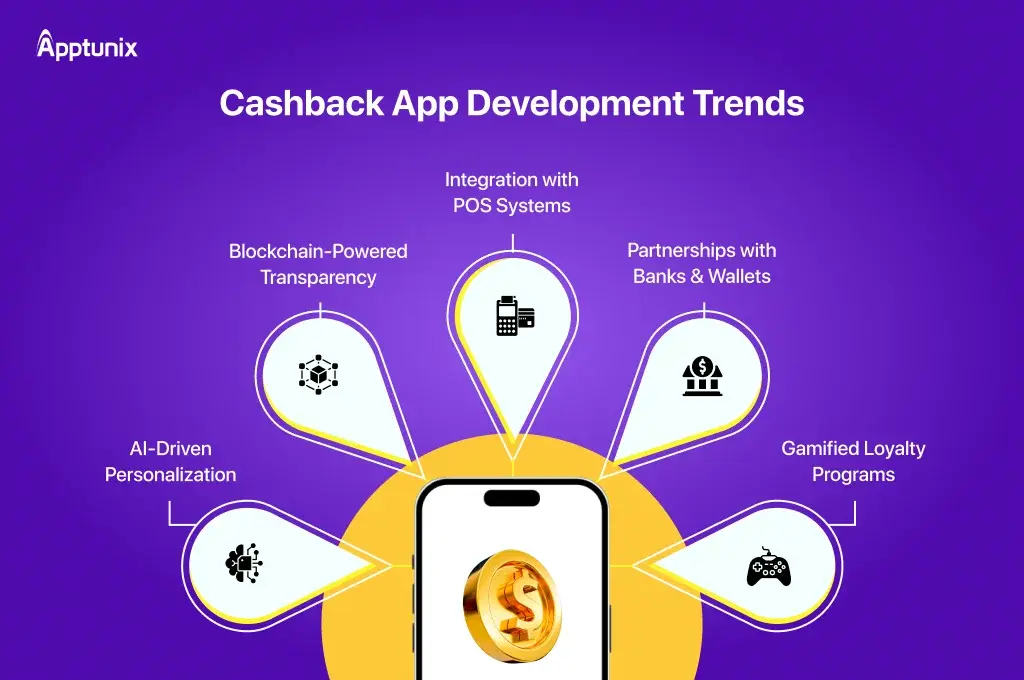
Apps will use artificial intelligence to analyze shopping habits and suggest the most relevant offers. This will turn them into some of the best mobile apps to make money for everyday users.
Decentralized systems will ensure secure and tamper-proof cashback tracking, thus giving customers complete confidence in the process.
Also Read: A Sure Shot Guide to Blockchain dApp Development
Direct links with retail point-of-sale systems will enable instant rewards, thus making earning seamless both online and offline.
Stronger collaborations will expand cashback options and help users enjoy benefits such as free money on cash app platforms.
Spin wheels, badges, and reward milestones will enhance user engagement. This will make these apps feel more like the best app to win real money while boosting customer retention.
The demand for cashback platforms is rising rapidly, driven by user interest in savings and loyalty programs. For businesses, this is the ideal time to invest and capitalize on a growing market. But choosing the right partner for cashback app development can make all the difference between an average product and a market-leading solution.
This is where we can help you. As an AI-powered mobile app development company, Apptunix specializes in creating scalable, secure, and feature-rich cashback solutions tailored to your business goals. Whether you want to launch a simple MVP or a complex free cash earning app, Apptunix, as a leading AI-powered cashback app development company, has the expertise to bring your vision to life.
If you are planning to build cashback application that stands out, we can help you design, develop, and launch it successfully. Let’s work together to transform your idea into a high-performing platform that delivers both customer loyalty and long-term revenue.
Q 1.How much does it cost to build a cashback app?
The cost ranges from $20,000 to $150,000+, depending on complexity (MVP, medium, full-featured), platform (iOS, Android, Hybrid), region, and integrations.
Q 2.How long does it take to develop a cashback app?
A simple MVP can take about 2 – 4 months; medium complexity: 4 – 6 months; advanced apps with multiple integrations, features, and high scalability needs may take 6 – 9+ months. Rest, it all depends upon your specific requirements.
Q 3.What are the must-have features in a cashback app?
User registration & profile, cashback tracking, wallet system, AI-based personalization, payment gateway integration, push notifications, gamification, multi-platform support.
Q 4.How do cashback apps make money?
Cashback apps generate revenue through affiliate commissions, sponsored listings, retailer partnerships, premium subscriptions, and ad revenue.
Q 5.What are the main challenges in building a cashback app?
Fraud prevention, accurate real-time tracking, secure payment processing, user trust, compliance & regulation, merchant integrations are some of the major challenges in building a cashback app.
Q 6.Should I develop my cashback app in-house or outsource?
Both have pros & cons. In-house gives more control, but costs & hiring are higher. On the other hand, outsourcing is faster and more cost-efficient, especially if you partner with a mobile app development team experienced in cashback app development.
Q 7.Which tech stack is best for a cashback app?
Use cross-platform frontend frameworks like React Native or Flutter; backend options like Node.js, Python, or Java; databases such as MongoDB or PostgreSQL; secure payment & affiliate APIs; and strong security (encryption, fraud detection, KYC).
Q 8.Can a cashback app give real money to users?
Yes. Apps can allow users to withdraw earned cashback via bank transfer, PayPal or equivalents. Real-money payouts depend on wallet integrations and local compliance regulations.
Q 9.What are the future trends in cashback app development?
Expect AI-driven personalization, blockchain transparency, POS & bank integrations, gamified loyalty programs, and mobile wallet & bank partnerships.
Q 10.Which are the top cashback apps in the market today?
Leading names include Rakuten, Ibotta, Honey, and TopCashback. These platforms showcase how cashback apps attract millions of users by offering real savings and seamless usability.
Q 11.How does cashback app development like Upside work?
Cashback app development like Upside focuses on building platforms that reward users for everyday purchases such as fuel, groceries, or dining. The model works by partnering with businesses that pay commissions for referred customers. A portion of that commission is passed on to users as cashback, thus creating a win-win: customers save money, and businesses gain loyal, repeat buyers.
Q 12.How do cashback coupons work in apps?
Cashback coupons apply a percentage discount or rebate when users make a purchase through the app. Instead of instant discounts, the reward is credited to the user’s in-app wallet or account. Once thresholds are met, funds can be withdrawn to a bank, PayPal, or other wallet, thus making coupons a powerful driver of repeat purchases.
Bonus Read: A Complete Guide to Crowdfunding App Development
Get the weekly updates on the newest brand stories, business models and technology right in your inbox.
Book your free consultation with us.
Book your free consultation with us.





